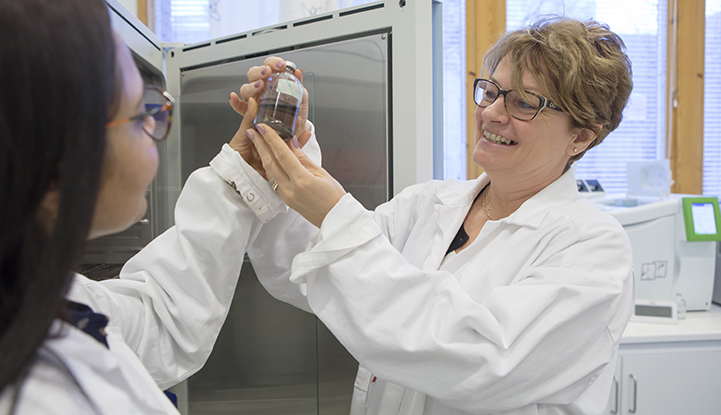Biogas Lab
The possibility of using different kinds of organic waste for the production of biogas is important in order to increase biogas production in the future. In the Biogas Lab, different processes are being used, partly using waste that is already common within biogas production, such as food waste, manure, food industry waste or agriculture. In these cases, it is important to develop the technology with the goal of making it more effective in achieving increased methane production.
The second important part of the research is to investigate how various other kinds of organic waste, such as textile waste, lumber by-products, feathers, fruit waste, wastewater with high levels of oil, etc. which hitherto have not been utilised for biogas production, can be used in the process. These types of waste are either difficult to break down biologically because of the materials' resistant structure, or because they contains certain substances that inhibit the biodegradation process. In these cases, it is important to develop techniques that affect the structure of the material to make it available to microbiological and/or enzymatic processes, or to use new rectifier configurations, such as by means of membranes that shield the inhibitors so that microorganisms do not become affected by the process.
Education
Research projects currently underway are linked to different doctoral projects in the field of Resource Recovery. For many research projects, the programmes of Bachelor's degree in Chemical Engineering--Applied Biotechnology or Master's Programme in Resource Recovery are also involved. We receive several study visits from secondary students during the year. The purpose of these visits is to raise interest in continuing studies with us by learning about our laboratory resources and the current research in progress.
Important instruments and resources
- Incubators to enable digestion tests at different temperatures
- 118 ml test reactors for batch digestion tests/screening
- CSTR reactors for continuous digestion processes
- Plug-flow reactors for continuous drying processes with high dry solids, so-called dry rubbing
- Membrane reactors
- GC for measurement of methane and carbon dioxide in the biogas
- Different type of flowmeter (gas/liquid)
- Water bath
- Centrifuges
Molecular Biotechnology Lab
The decomposition of organic matter is a complex microbiological process in which different types of microorganisms cooperate to break down and convert the various biological macromolecules found in organic waste fractions to biogas. It is therefore important to be able to investigate the microbiological composition of a biogas reactor and how it can change depending on the different process conditions or different types of waste, the so-called substrates, that are there. These studies can be done in our Molecular Biotechnology Lab, where both research and teaching occur.
Through both undergraduate (Chemical Engineering--Applied Biotechnology) and graduate education (Master's Programme in Resource Recovery), our students become familiar with the basic laboratory techniques in the field of molecular biotechnology. Research projects in progress are usually linked to doctoral education in the field of resource recovery.
Key Instruments/Resources
- -80 C freezer to store cell cultures
- PCR device
- Apparatus for gel electrophoresis
- Fluorescence microscope
- Shake incubator for cultivation
- Spectrophotometer
- Centrifuge
- CO2 incubator



